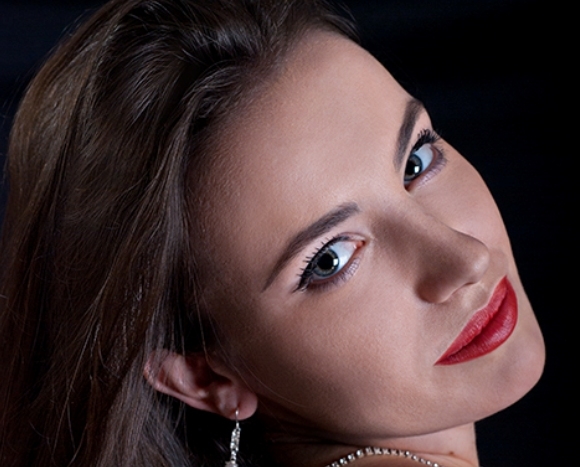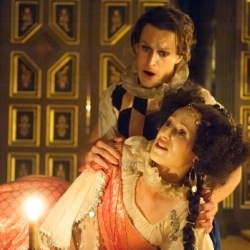Rachel Kelly, rising mezzo
The ROH Young Artist looks forward to appearing in ”Orfeo” at the Roundhouse

© Richard Vernon
Mezzo-soprano Rachel Kelly has caught the eye during her 18 months (and counting) on The Royal Opera’s Jette Parker Young Artists programme. Her portrayal of the title character in El gato con botas (Puss in Boots) was the cat’s whiskers, while alongside minor roles in the main house the young Irish singer also appeared as Miranda in Kasper Holten‘s production of Cavalli’s L’Ormindo, an enchanting staging that’s soon to be revived at the Sam Wanamaker Playhouse in Shakespeare’s Globe. Before that, though, she'll be singing Proserpina in Monteverdi’s Orfeo at the Roundhouse, Camden. Rachel Kelly spoke to WhatsOnStage during a break in rehearsals.
Through your Royal Opera work it’s not obvious where to pin you down. You’ve been cast in Wagner, Verdi, Bizet and Massenet, but what's your home turf?
I’d say my home turf is Rossini and Mozart at the moment, but a dream role for me would be Debussy’s Mélisande. I really want to play that part one day.
And have you thought out a career path for the future?
Maybe when I’m in my late thirties, and if my voice grows in the right direction, I’d love to sing Strauss roles like the Komponist [in Ariadne auf Naxos] and Octavian [in Der Rosenkavalier]. I also love the French heroines like Charlotte in Werther and Marguerite in La Damnation de Faust.
Proserpina is a small but very significant role in Orfeo. What are the special challenges in singing Monteverdi?
It’s quite different from singing something like Rossini, because you have to adjust your tone a little bit. That’s what I’m working on with Chris [conductor Christopher Moulds, who has replaced the indisposed Christian Curnyn at the helm]: straightening it out and also having extremely clear texts. We’re singing it in translation and there won’t be any surtitles. In this music the different colours you can create in the voice are more important than the power you’re expected to have with later opera. It’s a more immediate intimacy.
Orfeo is one of the very first true operas. Does it still work today as drama?
I wouldn’t call myself an early music expert by any stretch but it’s been a revelation how through-written it is. It’s not stop-and-sing; the drama is always moving forward. In that way it has a lot in common with later romantic operas. It’s not very long – maybe an hour and a half – so a bit like La bohème it’s go, go, go! Characters are established very quickly, and with Proserpina and Pluto you have to get their whole background straight away. So it’s a challenge for me as an actor, which makes it such a joy that we’re working with the director Michael Boyd. I’ve learnt so much from him. He’s been telling me to do less and less – just to have the communication and the intention behind everything instead of trying to emote too much. So there's no clutching at the breast in an over-exaggerated style; it’s ‘less is more’. I’ll be interested to see how the audience perceives it.
And the Roundhouse? It seems a left-field choice of venue for an early opera. How’s that working?
I don’t know because we haven’t rehearsed there yet! We’ve been in the Opera House so far, so I’m curious to discover that for myself. I know there’s going to be a subtle use of microphones because the stage is quite strange acoustic-wise, but Michael has been getting us to include the audience and really stage the opera in the round.
We have students from Guildhall School of Music and Drama who are in the chorus and also understudying each of the major roles. It’s been fun working with them having been a student myself only a couple of years ago. I think they’re learning a lot about the kind of behaviour you need to have in rehearsals because there's a lot of waiting around. They were a little shocked at that. But it’s part of the reality of being an opera singer, and something you probably never realise until you get out there into the big bad world. They’re also learning to cover roles, which is a huge deal: watching and learning the part, then, if the call comes to go on, nailing it. My advice to anyone doing a cover? If you get the chance to go on, really let them remember you!
Have you had to do any last-minute jump-ins during your time on the JPYA scheme?
I’ve had one, which was when I sang Mercédès on the opening night of Carmen with no stage rehearsals whatsoever. They called me up and I said yes, I’d go for it. I think the House was pretty impressed that I knew the role and even the dances, but that’s just preparation. But I didn’t get to go on as Rosina or Cherubino, sadly. Some day perhaps. Maybe I’ll get to sing Jenny in The Rise and Fall of the City of Mahagonny later this year – who knows?
You don’t stick pins in wax models of singers whose roles you covet, then?
Oh my God, no! I’m a good friend of Christine Rice who’s singing Jenny and no pins will be going in because of her. I wish her absolutely the best.
How has being a Jette Parker Young Artist helped your career?
It’s my first outing in the real world of opera, working with a company every single day on a regular basis. I’ve especially appreciated the language-speaking classes. I already speak French but I’ve been improving my Italian and German too, as well as getting stagecraft and dance experience and appearing on stage in small and medium roles. And I learn so much from each director and conductor who comes in.
Some of the biggest lessons have come from working with slightly more difficult people who are very famous – learning how to negotiate situations where you don’t compromise yourself too much as an artist but at the same time take on board what people are trying to give you. Toughening up has been a big thing.













